Interview with Martin from the CircleWay film team
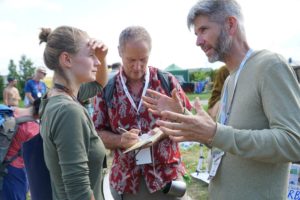
How did you come up with the idea to go to Estonia for the GEN conference?
So, I think I already had the idea last year.
As part of the CircleWay film making, we visited many communities and met lots of people. So we learned that there is this movement called the Global Ecovillage Network. This network connects many communities and ecovillages worldwide. And there is the European Network, GEN Europe, which hosts the annual conference, each year in another European community.
Could you please explain briefly what GEN is?
GEN, the Global Ecovillage Network, is a NGO that, as I said, connects communities around the world and has various tools for doing so. For instance, they use the four pillars of sustainability for their work.
This means that sustainable, regenerative development is based on four different pillars. These four pillars are:
1) The social = engages questions about how we interact with each other or how we live together. In this field, communities do a great deal of research. At this point, we again touch on the topic of circle culture or circle methods. These are people who live together in circles and have adopted a different form of communication – a different talking and feedback culture.
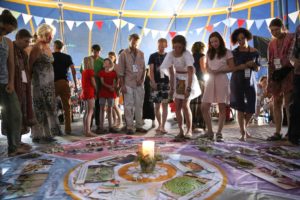
2) The economic = deals with economic issues, e.g. the idea of local commerce, alternative currencies, or how communities become self-sufficient and financially viable. Communities are addressing the question of how economy works sustainably and globally fair in various ways. So, how can sustainable farming be done without destroying the earth? There are many approaches with “GEN” or with the work of individual communities. For instance, many abandoned villages have already been revived and made habitable again.
3) The ecological = dedicated to the topic of how we deal with and relate to nature. There is the ecological agriculture, or ecological land use, including e.g. Permaculture. Here, too, stay similar questions about how we can feed ourselves without destroying the earth without pesticides and gene manipulation.
4) The cultural = this pillar deals with the world view, religion and spirituality. How do we see the world? How do we see ourselves as a world? How do we see ourselves as a community and what opportunities are there? How can we live in an individualized community with respect for other worldviews?
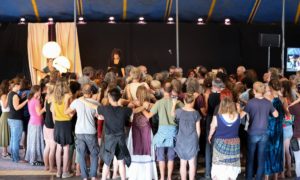
What touched you most during your stay?
Well, I think I was most interested in the human.
The 600 participants in the conference, who were all very different and at the same time all working and researching for a sustainable, regenerative future. They came from different countries and contexts and have brought different approaches. The nature of the gathering, that is, the energy they created was just very goose bumping.
There were so many exciting people from Europe, but also some from all over the world. There were scientists, there were professors, there were community members, there were many young people. Everyone was open and searching for possibilities. I was very fascinated by this exchange, quite simply, that took place there.
Another touching point was this concentrated power, now I almost wanted to say, of visionaries. They are not just visionaries, they are not hippies, but the whole thing makes sense. There are not just some “visions and theories” and it’s not just “singing and clapping”. But what is being done, what is being rehearsed, researched and lived is very sustainable in the sense that it is profound and working.
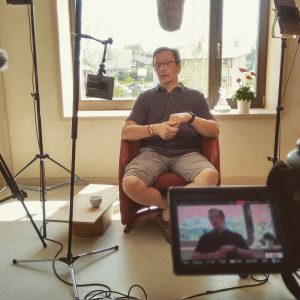
What does GEN do? What is GEN in your opinion? What is it good for?
GEN also works on the topic that communities get a voice at structural levels, in parliaments, for example, and that they act outwardly. What happens in the communities, the experiences that are made there, are shared and are changing and shaping the environment around the community. That communities are not just hippies, sects, or island villages that live in their own bubble, but that they are an open-minded, forward-looking gathering of people, who are able to contribute to the transformation needed on earth.
Why were you there? What is the output?
My vision is to communicate and spread sustainable and viable alternatives. That’s why I went to Estonia for the conference to get to know the GEN network and the opportunities it offers. To make video recordings and to conduct inspiring interviews. In the beginning of 2019, a short documentary will be publish in the popular social platforms. The complete interviews will also be provided for people who want to support this film project.
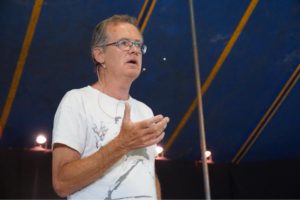
Which speakers or interviewees, have particularly impressed you?
We conducted interviews, e.g. with Kosha Anna Joubert, a South African woman with an exciting life story. She now lives in the community context and also works at GEN. She has shaped the network for years and is involved in various projects worldwide. This is very exciting, as she travels worldwide and also has to do with governments, with responsible people. A lot of implementation and realization is happening. We also talked to Robert Hall, who also works worldwide for the OSCE and ECOLISE. the European network for community-led initiatives on climate change and sustainability. Or we talked to Rupert Encinas (Eagle Flying), a native elder from Arizona. He gave us a breathtaking impression of his ancient traditions and wisdom.
Another interview was with Albert Bates, the founder of a big community in the US called “The Farm”. He is an author and works as a lawyer, where he already proceeded succesfully against companies for environmental pollution.
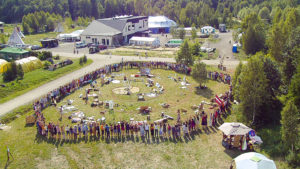
We also had an interview, which fascinated me most, with Jonathan Dawson. He teaches “Sustainable Economics” at the Schumacher Collage in Devon, England. For me it was very moving, because he spoke very powerful with a lot of feeling. When he teaches economics, he also shows his students that the most important thing about economics is their connection to nature. I found it very exciting to note: when we talk about economics, it is often decoupled from ecology, disconnected from nature. Actually, this connection is really important. He really goes out into the woods with his students and teaches there. I found that very moving, that there are pedagogically sustainable approaches such as Gaia Education-another form of learning and teaching. There are now several universities in Europe that apply these principles and new study programs are founded, where principles based on the four pillars of sustainability are applied or they are incorporated into existing ones.
More information about GEN can be found at www.ecovillage.org
and about GEN Europe at www.gen-europe.org


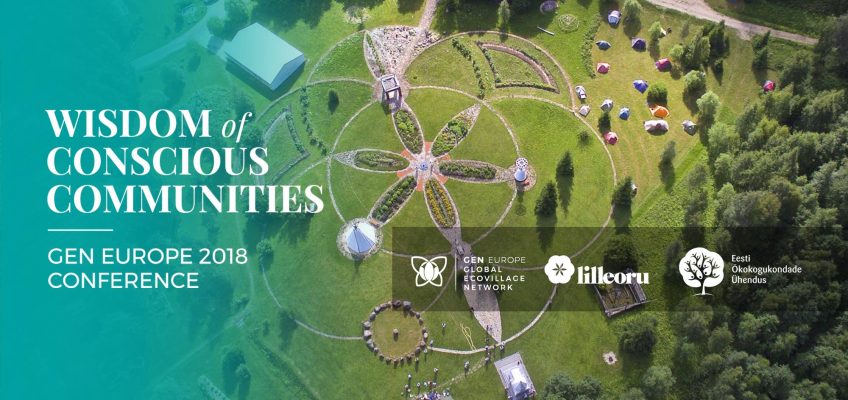
Leave a Reply
You must be logged in to post a comment.